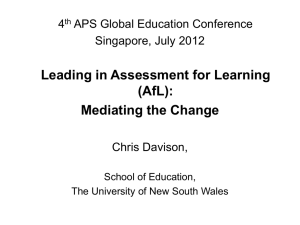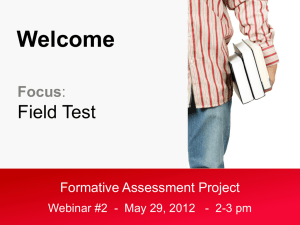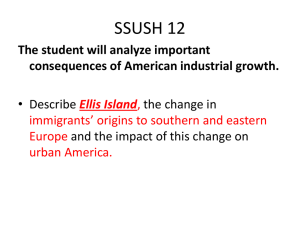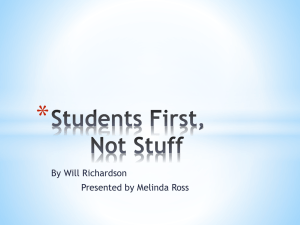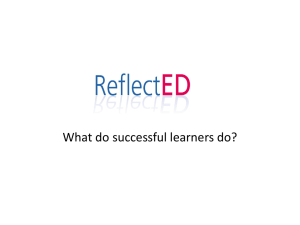Donna Hurford Presentation
advertisement
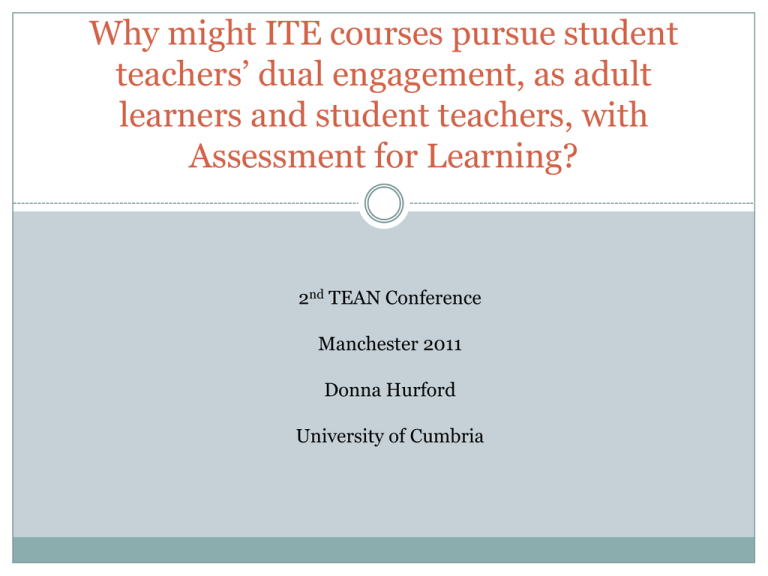
Why might ITE courses pursue student teachers’ dual engagement, as adult learners and student teachers, with Assessment for Learning? 2nd TEAN Conference Manchester 2011 Donna Hurford University of Cumbria Presentation Outline Framing and reframing an AfL question Initial Context: theory and practice Re-interpreting student learners and AfL Alternative perspectives Interpreting data or cautious intimations Answering or reframing the question What next? Framing the question …if teachers and student teachers struggle with their own ability to engage independently in learning, their effectiveness in enabling pupils to become independent learners may be compromised. This inability to engage with independent learning may in turn have implications for all phases of education. Read and Hurford, 2008, p. 49 If they are to become confident and informed practitioners of AfL in their own learning and as teachers they need to experience and recognise the value of AfL for all learners. Slater et al., 2009, p.133 Framing and reframing the question What effect does student teachers’ engagement with Assessment for Learning as adult learners have on their practice as student teachers? Why might ITE courses pursue student teachers’ dual engagement, as adult learners and student teachers, with Assessment for Learning? Context: theory and practice Black &Wiliam, 2003; Assessment Reform Group, 2002 Philosophy AfL in schools Ward, 2008; DCSF, 2008; Alexander, 2009 Reality AfL observed on placement Linking learning Various Outcome (s) AfL for adults Model and embed AfL in ITE course Sadler, 1998; Rust et al, 2003; Boud, 1988 Teacher pedagogy Loughran, 2006 Slater et al 2009; Read and Hurford, 2008 AfL opportunities for adult learners: •Course expectation: autonomous or independent learners and deep learning (Boud, 1988; Entwistle, 1996) •Generate assessment criteria (Assessment Reform Group, 2002) •Engage with formative potential of generic feedback (Black and Wiliam, 2003) •Peer dialogue on formative assessment (Black and Wiliam, 2003) •Interpret tutor feedback (Rust et al. 2003) •Engage with exemplars of quality (Sadler, 2007; 2009) Linking learning Black &Wiliam, 2003; Assessment Reform Group, 2002 Philosophy AfL in schools Ward, 2008; DCSF, 2008; Alexander, 2009 Reality AfL observed on placement Linking learning Various Outcome (s) AfL for adults Model and embed AfL in ITE course Sadler, 1998; Rust et al, 2003; Boud, 1988 Teacher pedagogy Loughran, 2006 Slater et al 2009; Read and Hurford, 2009 Linking learning: student learners and AfL Higher Education Initial Teacher Education Primary School Re-interpreting student learners and AfL I did a Business Studies degree, we tended to do more group projects than individual assignments. I’m anxious about having to write essays, it’s been five years since I wrote one. I don’t know what all these terms mean. Is Assessment for Learning another government initiative? I’m relying on the course to tell me what I need to know... I’m relieved to get a place on this course; it’s the only one that fits in with my work and family commitments. I prefer to study independently, I’m good at managing my time... I have some classroom experience; I volunteered at I’m keen to get started now, I’ve my child’s school for a day a wanted to be a teacher since I was at week for two terms; I know school but it’s only now I have the what sort of teacher I want to opportunity... be... Alternative perspectives ‘data suggests that practice of independence is encouraged by an absence of information rather than an active facilitation of helpful practices’ Tobell et al, 2010, p.274 Tobell et al. 2010 draw on Wenger’s (1998 cited in Tobell et al. 2010, p.266) terminology and refer to these new-to-post-graduate-study students as ‘peripheral participants’ Alternative perspectives ‘I wanted to understand why it was that some students did not engage as expected…’ Hockings, 2009, p.88 ‘With more information about students’ epistemological, socio-economic and cultural backgrounds, a more holistic picture of the factors influencing academic engagement and participation would emerge. This, I conjecture, would be more useful than any single perspective analysis for the purposes of developing pedagogies designed to engage all students.’ Hockings, 2009, p. 95 Alternative perspectives ‘Phenomenography investigates the qualitatively different ways in which people experience or think about various phenomena.’ Sherman , 1988, p.144 ‘when investigating people’s understanding of various phenomena , concepts and principles, we repeatedly found that each phenomenon, concept or principle can be understood in a limited number of qualitatively different ways.’ Sherman , 1988, p.143 How do you think these approaches, have, if at all, affected your engagement as an adult learner? Do you think there is a link between understanding and practising AfL and IL as an adult learner and as a teacher? Yes – No – Maybe- Don’t Know Provide an explanation for your answer 1. Gave me the opportunity to think about my learning and where I felt the gaps were or if I was confident in areas Maybe Because there would appear to be a link between the reflective elements and identifying learning needs 2. Student generated success criteria has made the criteria clearer and easier to understand Yes understanding practically as a learner has helped my teaching. Provided a context and I can see that works from my own learning 3. I know that I have sole responsibility for my own learning and am aware of resources I need to access in order to progress Don’t Know No response 4. I used every opportunity to learn and gain more knowledge and insight Don’t Know I'm not sure what you mean. I prioritised my learning needs, identified weak spots and found ways of plugging those gaps and moving on in my learning using independent study 5. Helped to take ownership of the assignments for Ed studies and feel more involved with the subject No Response I think there is a link, but it is not an easy concept and I think more should be done to help with applying the concept in our teaching practice Interpreting Data ‘It is a goal of phenomenography to discover the structural framework within which various categories of understanding exist. ‘ Sherman, 1988, p.145 l 4 l 5 l (l) l l l l Yes; Maybe; No; Don’t Know 3 l Experiential/ Contextual l l Responsibility for learning l l Self aware 2 Affective l Pragmatic Metacognitive 1 l Maybe l Yes l Don’t Know l Don’t Know l No Response Interpreting Data or cautious intimations... Tentative response patterns 1. meta-cognitive; self aware; experiential/contextual 2. pragmatic; self aware; responsible for learning 3. Yes, there is a link; refer to AfL in classroom practice Answering or reframing the question Why might ITE courses pursue student teachers’ dual engagement, as adult learners and student teachers, with Assessment for Learning? What might ITE courses consider when pursuing student teachers’ dual engagement, as adult learners and student teachers, with Assessment for Learning? Linking learning: student learners and AfL Higher Education Initial Teacher Education Primary School What next? Listen to student teacher narratives about AfL; their own learning and their application of AfL in the classroom Be cautious about ‘seeing’ emerging patterns – be open to dissonance Apply phenomenographical approach and incorporate other approaches where it seems appropriate Engage students in dialogue about scaffolding metalearning References Alexander, R. (2009 (ed.) Children, their world, their education. Final Report and Recommendations of the Cambridge Primary Review. Oxon: Routledge. Assessment Reform Group (2002) Assessment for Learning: 10 Principles. London: Assessment Reform Group. Black, P., Harrison, C., Lee, C. Marshall, B. & Wiliam, D. (2003) Assessment for learning: putting it into practice. Maidenhead: Open University Press. Boud, D. (1988) ‘Moving towards Autonomy’ in Boud, D. (ed.) (2nd ed) Developing Student Autonomy in Learning. London: Kogan Page. pp 17-39. Department for Children, Schools and Families (2008) The Assessment for Learning Strategy. Nottingham: DCSF Publications. Entwistle, N. (1996) Recent research on student learning and the learning environment. In Tait, J. and Knight, P. The Management of Independent Learning. London: SEDA. Hockings, Christine (2009) 'Reaching the students that student-centred learning cannot reach', British Educational Research Journal, 35 (1), pp.83-98. Loughran, J. (2006) Developing a Pedagogy of Teacher Education. Oxon: Routledge. Read, A. and Hurford, D. (2008) ‘Opportunities for personalised learning: enabling or overwhelming?’ Practitioner Research in Higher Education, 2 (1). pp. 43-50. Rust, C., Price, M. & O’Donovan, B. (2003) ‘Improving Students’ Learning by Developing their Understanding of Assessment Criteria and Processes’ .Assessment & Evaluation in Higher Education, 28 (2) pp.147-164 Sadler, D. R. (1998) ‘ Formative Assessment: Revisiting the territory.’ Assessment in Education 5 (1) 77Sherman, R. R. and Rodman, W.B. (ed) (1988) Qualitative research in education; focus and methods. London: Falmer Press Slater, A., Shaw, S., Read, A. and Hurford, D. (2009) ‘Tell me what to do?’. In: Jackson, Alison, (ed.) Innovations and Development in Initial Teacher Education : A selection of conference papers presented at The 4th ESCalate ITE conference, University of Cumbria, Carlisle campus 16th May 2008. ESCalate, pp. 125-134. Tobell, J., O’Donnell, V., Zammit, M. (2010) ‘Exploring transition to postgraduate study: shifting identities in interaction with communities, practice and participation.’ British Educational Research Journal 36 (2), pp.261-278 Ward, H. (2008) ‘Assessment for Learning has fallen prey to gimmicks, says critic’, Times Educational Supplement, 17 October [Online]. Available at: http://www.tes.co.uk/article.aspx?storycode=6003863 (Accessed 14 May 2011).
